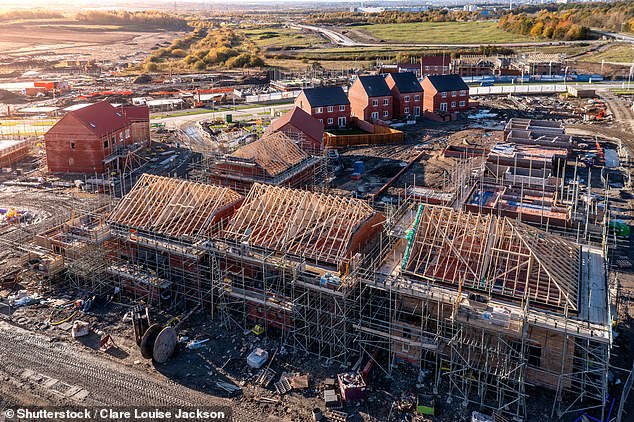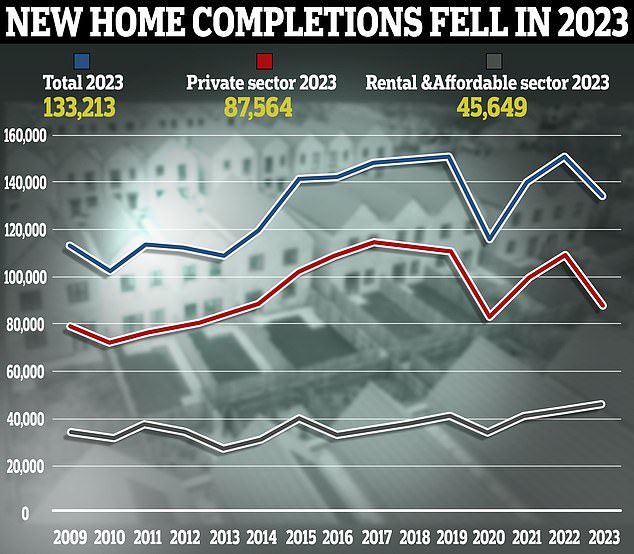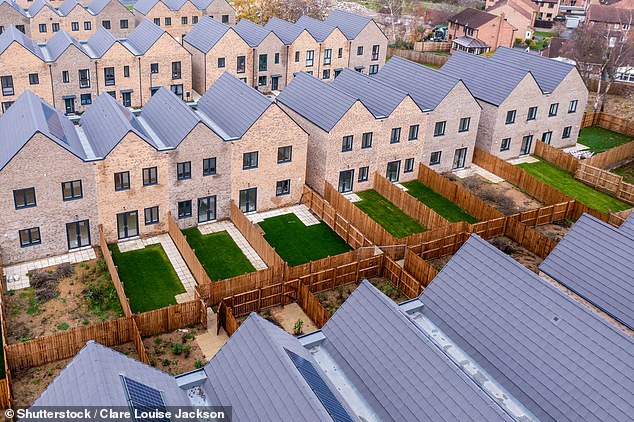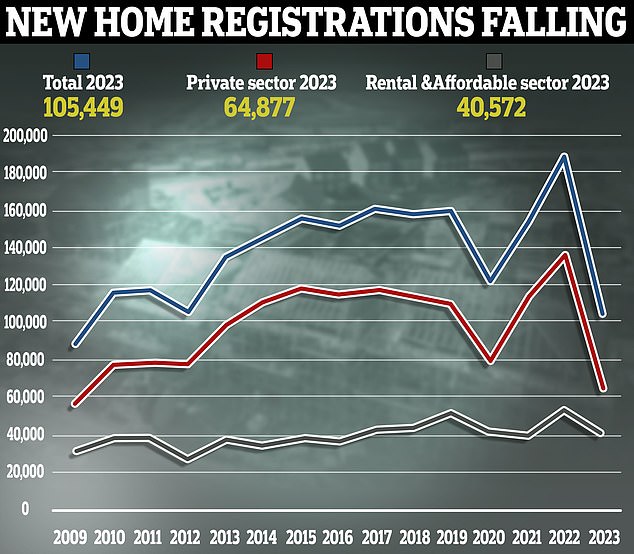The number of new homes planned by builders almost halved last year, new figures show.
New home registrations fell 44 per cent in 2023 compared to the previous year, according to the National House Building Council, which is the UK’s largest provider of warranties and insurance for new homes.
Registrations occur when a developer or homebuilder registers their intention to build a new home.
The NHBC says the number of new homes registered fell from 189,009 in 2022 to 105,449 last year, a drop of 83,560.
New home registrations fall 44%: In 2023 there was a decline in new home registrations – the process by which a developer registers their intention to build a new home.
Private sector registrations, not including homes built by housing associations or councils, were the hardest hit, falling 53 percent, from 136,805 in 2022 to 64,877 last year.
All UK regions experienced a fall in registrations, with the biggest year-on-year falls in the North West of England, down 61 per cent, and the West Midlands, down 59 per cent.
Separate data from the Department of Levelling, Housing and Communities showed the number of sites where construction work began fell by 68 per cent between July 1 and September 30, 2023, compared to the same point a year earlier.
According to the NHBC, higher interest rates, inflation and problems with planning approvals were the factors that discouraged builders and developers last year.
Two-year fixed mortgage rates peaked at 6.86 per cent in the summer, according to Moneyfacts, while the inflation rate only fell below 6 per cent in October, having been above 10 per cent earlier. of 2023.
This caused many potential first-time buyers, moving companies and buy-to-let investors to postpone their plans.
Housing transactions fell 19 per cent during 2023 to just over 1.02 million, according to HMRC figures.
Faced with this drop in buyer demand, many builders and developers appear to have scaled back their future construction plans.
Steve Wood, chief executive of NHBC, said: “The backdrop of high interest rates, significant inflationary pressures and challenges with planning permissions has suppressed private sales production in 2023.”

Fewer sales: Housing transactions fell 19% during 2023, according to HMRC figures
NHBC figures also revealed that 133,213 new homes were completed in 2023, down 12 per cent on 2022, when 151,308 were completed.
Completions refer to when it is confirmed that a plot is ready for occupation.
One area where completions increased last year was in the rental and affordable housing sector. This refers to new homes completed by housing associations and build-to-rent companies.
Completions rose 10 percent last year in this sector, according to NHBC.
Wood added: ‘Whilst there were considerable supply and demand pressures on the new homes market in 2023, it is very encouraging to see record numbers of new home completions in the affordable sector.
“Several major housebuilders have partnered with housing associations and Build to Rent providers, reorienting parts of their production to help address demand for affordable housing.”

Why are fewer homes being built?
Peter Bill, author of Property Planet and co-author of Broken Homes: Britain’s Housing Crisis: Faults, Factoids and Fixes says the UK continues to fall far short of the government’s housebuilding targets.
It says: “The 44 per cent collapse in registrations bodes poorly for the completion of new homes in 2024.
“The drop in completions from 153,000 in 2022 to 131,000 in 2023 takes us further away from the magic target of 300,000, making the Labor administration’s promises to hit the target look as empty as those of the Conservatives.”
The 44% drop in registrations is a bad omen for new construction completions in 2024
Peter Bill, author and real estate commentator
The drop in completions was felt most severely in the private sector, which relates to new homes completed by builders for private sale.
NHBC data showed private sector completions fell 20 per cent year-on-year.
Anthony Codling, European head of housing and building materials at investment bank RBC Capital Markets, says it is “not surprising” that new build completions and registrations have fallen and believes the current planning system is to blame.
“The mini-Budget pause and the rise in mortgage rates in 2023 didn’t help, but that’s not the whole story,” Codling says.
‘As mortgage rates begin to fall and house prices stabilize, demand is improving and this sheds light on the real problem, the supply side, and that means planning.
‘Until the planning system improves, we will struggle to build the homes we need.
‘The quick fix is to reset house building targets. It will be interesting to see how many party manifestos include them.’
‘Housing targets are obviously hot political issues. Voters want the housing market to be fixed, this means more housing, but not close to it. Unfortunately you can’t have your housing cake and eat it.

Supply and demand: New home registrations are expected to rise again this year as home builders respond to increased demand.
Better signs ahead?
The inflation rate fell again over the course of last year, allowing the Bank of England to begin keeping the base rate at 5.25 percent from September.
Mortgage lenders began cutting rates starting in September and this rate cut continued through 2024. In January alone, more than 50 mortgage lenders reduced their residential rates, some more than once.
While rate cuts have largely stalled over the past two weeks, borrowers who get the cheapest deals can now get just under 4 percent when they lock in rates for five years or just over 4 percent when They set them for two years.
David Hollingworth, associate director at L&C Mortgages, says: “The hope will be that the substantial improvement in mortgage rates and the outlook for mortgage rates will help restore consumer confidence and bolster demand, allowing builders to look ahead. the future with greater confidence”.
“Homebuyers will want to see more supply, not less, which could risk prices continuing to rise.”
With the Bank of England expected to start cutting interest rates this year and mortgage rates having fallen, NHBC’s Steve Wood is confident there will be a resurgence in construction activity this year.
“There are some signs of demand returning to the market,” Wood says. ‘We would expect a better position in 2024 as consumer confidence begins to recover and mortgage rates begin to fall.
‘With the general election just around the corner, we may also see new incentives for homebuyers influencing construction volumes.
“In the medium and long term, the industry would welcome measures that restore consumer confidence and encourage market growth.”
Some links in this article may be affiliate links. If you click on them, we may earn a small commission. That helps us fund This Is Money and keep it free to use. We do not write articles to promote products. We do not allow any commercial relationship to affect our editorial independence.


